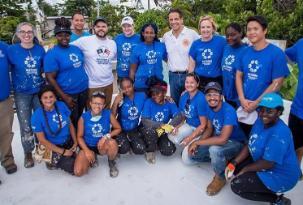
The Sustainable Mental Health Support for Children in Puerto Rico program, funded by UNICEF USA and implemented by the Institute for Disaster Mental Health at the State University of New York at New Paltz, created a two-tiered program of response to the mental health needs of children in response to Hurricane Maria, and was adapted and expanded to address the additional needs created by the 2020 earthquakes. The program was structured in two tiers:
Together, these two tiers were designed to lay the foundation for the development a sustainable network of mental health service provision for children. It creates an island-wide cadre of professional educators trained to deliver mental health support training to other educators, while also equipping future mental health providers with the training and experience necessary to effectively work with children exposed to disasters and traumatic events
This program and curriculum is currently being adapted to address COVID-19 related stressors and needs, as well as being expanded to other regions.
Partnership with The National Center for Disaster Preparedness at Columbia University:
Based on past experiences, gaps in child protection services and protocols in the operation of emergency shelters in disaster situations can lead to the unprotection of children, and the possibility of abuse, neglect, trauma, or lack of appropriate medical care can be exacerbated, limiting a child's chances of recovery and resilience after a disaster.
These online modules aim to provide planners, staff, and emergency shelter volunteers in Puerto Rico with basic recommendations and best practices for incorporating the needs of children and families into the planning and operation of emergency shelters.
The recommendations provided in the modules are not intended to be prescriptive or replace official protocols for the operation of emergency shelters, but are intended to fill gaps in planning, to ensure that in the event of an emergency we are as prepared as possible to create spaces where the well-being and safety of children is always a priority.
To view these modules, follow the link below:
Basic Considerations for the Well-being and Safety of Children in Emergency Shelters
Related News:
